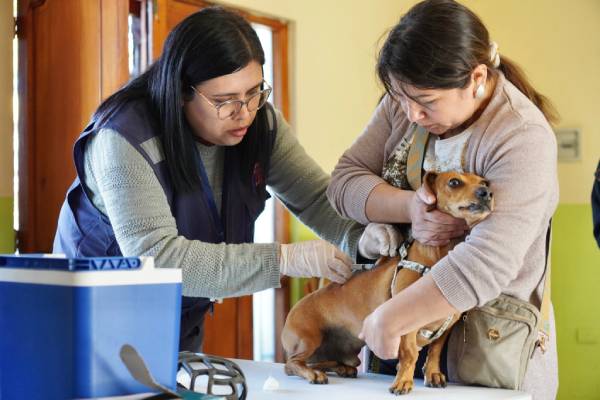The Zoonosis Unit of the Ñuble Health Authority reported 7 cases of bats detected with rabies so far this year in Ñuble. The figure is equal to that registered in 2022. Ximena Salinas, Seremi of Health, explained that 76 bats have been sent for analysis to the Institute of Public Health (ISP), of which 5 tested positive for this zoonotic disease in Chillán, one in Pinto and another in San Carlos.
“On the 28th of this month, World Rabies Day is commemorated, with the aim of promoting the fight against this pathology, reinforcing awareness about its prevention and control,” said Salinas, after an anti-rabies vaccination operation developed by that portfolio and Veterinary Medicine from the University of Alba, in the Campos de Doña Beatriz sector of the regional capital.
“During this year, in addition, other operations have been carried out in conjunction with Veterinary Medicine of the University of Concepción, carrying out an immunization campaign for domestic pets in community centers in the Pedro Lagos and 11 de Septiembre Population, totaling 115 inoculated dogs and cats. against rabies,” the authority said, urging people to have the respective vaccination certificates and comply with good responsible pet ownership.
The sending of bats to the ISP is part of a permanent surveillance system for this deadly viral disease that affects animals and people. “The vaccine must be administered from the animal’s two months of age, repeated at one year of age and then continued according to the indications indicated by the vaccine manufacturer, which will be informed by the veterinarian who carries out the controls. health of pets,” said Jorge González, veterinarian in charge of the Zoonosis Unit of the Seremi de Salud.
For his part, the owner of vaccinated animals must keep the corresponding certificate that the professional gives him after each vaccination, which may be required by the Health Authority, which may sanction, if this requirement is not met. “In addition, it is important for citizens to know that this sophisticated mammal has crepuscular qualities, therefore, finding one of them in broad daylight may be associated with being affected by said virus with the risk of transmission to animals and people.” .
Among the preventive measures to be adopted by citizens, it is urged not to handle bats or any other wild animal without basic personal protection measures (gloves, masks, goggles), in addition to preventing pets from capturing or playing with bats.
“It is important to adopt precautionary measures when capturing dying, dead or bats that have difficulty flying and exhibiting erratic behavior, for sending them to the ISP. To do this, you can call 42-2585068/ 42-2585296 or the copies can be delivered to the health authority’s offices, on Bulnes and Arauco streets,” Salinas explained.
Bats in Chile are protected by Hunting Law No. 4,601 (modified in 1996) and its Regulations, so their hunting or capture is prohibited. However, if it is necessary to capture individuals or colonies, manipulate or transfer them, people must request a special authorization from the Agricultural and Livestock Service (SAG).

